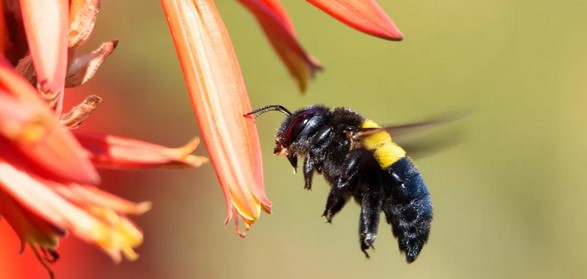 Do wood boring bees sting? This is a common question asked by many people who are concerned about the safety of their family and property. Wood boring bees are a type of bee that burrows into wood to create their nests. While they do not typically sting, they can become aggressive if they feel threatened. In this article, we will discuss the risks associated with wood boring bees and how to prevent them from becoming a problem. We will also discuss the signs of an infestation and what to do if you find one. By understanding the risks and taking the necessary precautions, you can protect your family and property from wood boring bees.
Do wood boring bees sting? This is a common question asked by many people who are concerned about the safety of their family and property. Wood boring bees are a type of bee that burrows into wood to create their nests. While they do not typically sting, they can become aggressive if they feel threatened. In this article, we will discuss the risks associated with wood boring bees and how to prevent them from becoming a problem. We will also discuss the signs of an infestation and what to do if you find one. By understanding the risks and taking the necessary precautions, you can protect your family and property from wood boring bees.
How to Identify Wood Boring Bees and Avoid Being Stung
Wood boring bees, also known as carpenter bees, are a type of bee that can cause damage to wooden structures. While they are not aggressive and rarely sting, it is important to identify them and take steps to avoid being stung.
To identify wood boring bees, look for a bee that is about the size of a bumblebee, with a shiny black abdomen and a yellow or white face. They are often seen hovering around wood structures, such as decks, sheds, and fences. The female wood boring bee will drill a hole in the wood to create a nest, while the male will hover around the nest to protect it.
To avoid being stung, it is important to take steps to prevent wood boring bees from nesting in your home or yard. Start by sealing any cracks or crevices in wood structures, as this will make it difficult for the bees to enter. Additionally, you can use insecticides to kill any existing bees and prevent new ones from entering.
If you do come into contact with a wood boring bee, remain calm and slowly move away. Do not swat at the bee or try to capture it, as this may cause it to sting. If you are stung, apply a cold compress to the area and seek medical attention if necessary.
By taking the necessary steps to identify wood boring bees and prevent them from nesting in your home or yard, you can avoid being stung and protect your wooden structures from damage.
What Are the Risks of Wood Boring Bee Stings and How to Prevent Them?
Wood boring bees, also known as carpenter bees, are a type of bee that can cause a great deal of damage to wooden structures. While they are not typically aggressive, they can sting if they feel threatened. It is important to understand the risks associated with wood boring bee stings and how to prevent them.
The most common risk associated with wood boring bee stings is an allergic reaction. People who are allergic to bee stings may experience a range of symptoms, from mild swelling and itching to anaphylactic shock. If you are allergic to bee stings, it is important to seek medical attention immediately if you are stung.
In addition to allergic reactions, wood boring bee stings can also cause pain and swelling. The sting site may become red and inflamed, and the area may be tender to the touch. In some cases, the sting may cause a localized infection.
Fortunately, there are a few steps you can take to prevent wood boring bee stings. First, it is important to inspect your home for any signs of wood boring bee activity. If you find any, it is important to take steps to remove the bees and repair any damage they have caused.
Second, it is important to wear protective clothing when working around wood boring bees. Long sleeves and pants can help protect your skin from stings. Additionally, it is important to avoid swatting or otherwise disturbing the bees.
Finally, it is important to keep your home well-maintained. Wood boring bees are attracted to wood that is in poor condition, so it is important to repair any damage and seal any cracks or crevices.
By following these steps, you can help reduce the risk of wood boring bee stings and protect your home from damage.In conclusion, wood boring bees are not known to sting humans, but they can cause damage to wood structures. To prevent wood boring bees from infesting your home, it is important to seal any cracks or crevices in the wood, and to keep the area around the wood clean and free of debris. If you do find wood boring bees in your home, it is best to contact a professional pest control service to safely remove them.